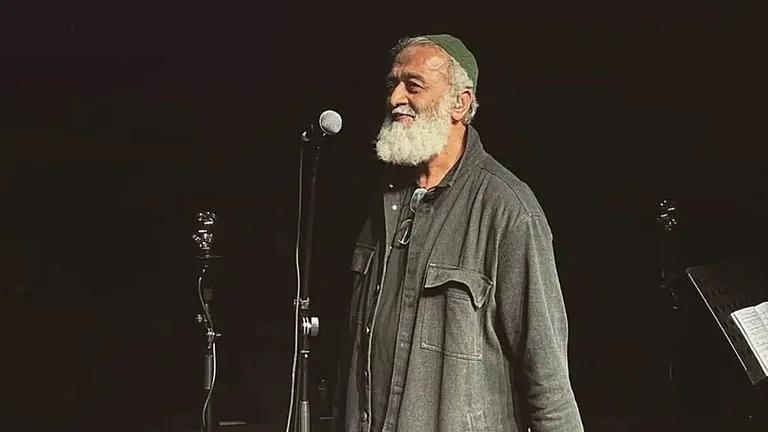
The classic in the head
Eduardo Halfon is doing with his entire oeuvre what Julio Cortazar did with one novel, Hopscotch, in the 1960s. Speaking at the PEN World Voices Festival, the Guatemala-born Halfon takes the audience through the ‘Table of Instructions’ page of Hopscotch with its options for the reader. One can either finish at chapter 56 or hopscotch through 155 chapters in a sequence suggested by the author.
Halfon, a qualified engineer, will continue one of the chapters of his The Polish Boxer in his next book. Some editions of his books will have more (or fewer) chapters than the original. This grand mosaic will not follow a predetermined pattern, he tells me, for “I have no overall plan, just a series of small plans which lean on one another”. Halfon, 42, studied in the US and thinks in English, but somehow “between my head and the page the words turn into Spanish”. This attempt to impose disorder on his work is one of the most exciting ongoing literary experiments.
“What if everything is not tied up at the end?” I ask before realising that lack of a plan is a plan too. But Halfon responds easily: “Then I will let my training as engineer take over, prop up areas that need propping up, add a bit of concrete here, chip away a wall there and so on.” Halfon was part of a group speaking on a classic that influenced them. There was Booker winner James Kelman and Genichiro Takahashi from Japan. Nadeem Aslam, the finest contemporary writer in English, spoke about the influence of the Polish writer Bruno Schulz. The discussion on translation involved the audience too. Should a translation be faithful to the writer or the reader? Should it not convey some of the excitement and passion of the original? Takahashi responded passionately, eyes shining, occasionally laughing. His interpreter, however, seemed to suck the excitement out of the author’s speech, converting it into something flat and featureless. The irony was not lost on anyone.
Late show, low jinks
I am not a David Letterman fan, yet audience tickets for the recording of the Late Show are not to be sneezed at. Before you are guided into the auditorium, ushers crack jokes and check the strength of your applause. Pre-show is about priming the audience. “You must laugh loudly even if David is not funny,” they tell us repeatedly, “David performs best when he gets the energy from your cheering.” At the end of the fake laughter and passionless applause, the audience could have used the energy too. We are applaused-out and laughed-out by the time Letterman finally appears.
The guests are Dr Phil, a TV advice-giver, and Chris O’Dowd, the actor from the TV series The IT People and star of the movie Bridesmaids. Chris is funny, but gets little air time. Letterman keeps running down Dr Phil. At one stage he says, “Do you want me to hold your wallet while you go and f*** yourself?” Genuine laughter at last for the first time in the scripted show.
Batting with Bradman
The C.C. Morris cricket library in Pennsylvania is a fabulous repository of books, periodicals and memorabilia. Preserved in a glass case is a silver lighter presented by Ranjitsinhji to the American fast bowler Barton King, inventor of the outswinger. There are other treasures too. Like Don Bradman’s bat. Library president Paul Hensley is kind enough to open it for me on a Sunday when the Philadelphia Cricket Festival is coming to a climax. Then he places Bradman’s bat in my hand, and I take my stance. Gosh! How did the great man average 99.94 with what in comparison to today’s bats is merely an emaciated piece of wood?
How to tell you have returned
After a 20-hour journey, the last thing one wants is a confrontation. So I keep quiet when an immigration official at the Bangalore international airport rudely tells a woman in a wheelchair that since there is a separate queue “for the handicapped”, she should go there and not waste his time. My wife and I pass through but our son is held up. “You go see that official,” the man at Counter 17 (name supplied on request) with the power to deny entry tells him. There is no one at ‘that official’s’ table. “So what’s the problem?” I ask in my best sleep-deprived voice. “I can’t tell you,” says Counter 17. A senior finally arrives, glances at my son’s passport and promptly asks Counter 17 to stamp it. So what was the problem? We will have to read Counter 17’s autobiography to find out. His senior apologises. Meanwhile, the queue to get past the lone official who has to verify that passports have been stamped (a peculiarly Indian custom) has doubled. We are truly back home.
Grandma, it’s Lucky
The grandma- friendly (to quote the New York Times) Tom Hanks mouthing profanities in Lucky Guy, his Broadway debut. Seems incongruous, but great performance.
(Suresh Menon is editor, Wisden India Almanack, and author, most recently, of Pataudi: Nawab of Cricket); E-mail your diarist: talmenon AT yahoo.com
























